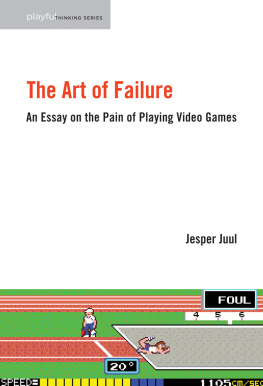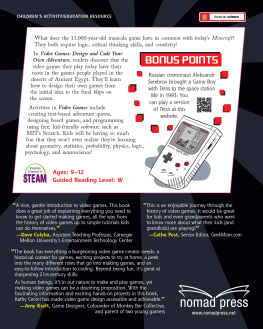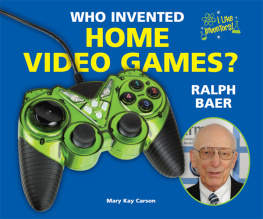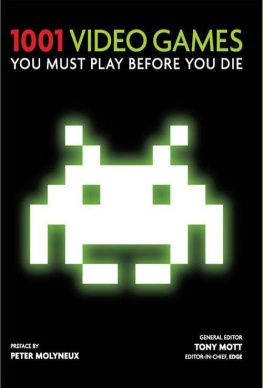
Video Games and the Law
The video game industry is big business, not only in terms of the substantial revenue generated through retail sales of games themselves, but also in terms of the size and value of parallel and secondary markets. Consider any popular video game today, and you most likely are looking at a franchise that includes not only the game itself and all of its variants, but also toys, books, movies, and more, with legions of fans that interact with the industry in myriad ways. Surveying the legal landscape of this emergent industry, Ron Gard and Elizabeth Townsend-Gard shed light on the many important topics where law is playing an important role. In examining these issues, Video Games and the Law is both a legal and a cultural look at the development of the video game industry and the role that law has played so far in this industrys ability to thrive and grow.
Ron Gard is Director of the Law/Culture/Innovation Initiative and teaches in the Communication department at Tulane University. He is a Non-Resident Fellow at Stanford Universitys Center for Internet and Society.
Elizabeth Townsend Gard is the Jill. H and Avram A. Glazer Professor in Social Entrepreneurship at Tulane University, Director of the Tulane Center for IP, Media & Culture, and teaches intellectual property at Tulane Law School.
Video Games and the Law
Ron Gard and Elizabeth Townsend Gard
with contributions from John Billiris, Karl Craig, Mark Donatiello, Markeecha Forcell, Kelvin Lai, Mitchell Longan, and Alexandra Stork
First published 2017
by Routledge
711 Third Avenue, New York, NY 10017
and by Routledge
2 Park Square, Milton Park, Abingdon, Oxon OX14 4RN
Routledge is an imprint of the Taylor & Francis Group, an informa business
2017 Taylor & Francis
The right of W. Ronald Gard and Elizabeth Townsend Gard to be identified as the authors of this work has been asserted by them in accordance with sections 77 and 78 of the Copyright, Designs and Patents Act 1988.
All rights reserved. No part of this book may be reprinted or reproduced or utilised in any form or by any electronic, mechanical, or other means, now known or hereafter invented, including photocopying and recording, or in any information storage or retrieval system, without permission in writing from the publishers.
Trademark notice: Product or corporate names may be trademarks or registered trademarks, and are used only for identification and explanation without intent to infringe.
Library of Congress Cataloging-in-Publication Data
Names: Gard, Ron, author. | Townsend Gard, Elizabeth, author.
Title: Video games and the law / Ron Gard and Elizabeth Townsend Gard ; with contributions from John Billiris, Karl Craig, Mark Donatiello, Markeecha Forcell, Kelvin Lai, Mitchell Longan, and Alexandra Stork.
Description: New York : Routledge, 2017.
Identifiers: LCCN 2016050413| ISBN 9781138630765 (hardback) | ISBN 9781315209210 (ebk)
Subjects: LCSH: Video gamesLaw and legislationUnited States.
Classification: LCC KF3994 .G37 2017 | DDC 344.73/099dc23
LC record available at https://lccn.loc.gov/2016050413
ISBN: 978-1-138-63076-5 (hbk)
ISBN: 978-1-315-20921-0 (ebk)
Typeset in Times New Roman
by Apex CoVantage, LLC
Contents
Ron Gard holds a PhD in English with an emphasis in Cultural Studies and a JD from the University of Arizona. He has taught at Tulane University, University of New Orleans, University of Arizona, and California State University Northridge. He is a licensed attorney in New York. At Tulane University, he divides his time teaching film, media, and social theory courses in the Communication Department; entrepreneurship in the Social Innovation Social Entrepreneurship minor program; and running the Law/Culture/Innovation Initiative. He is the CEO of Limited Times, LLC, and is a nonresident fellow at Stanford Law Schools Center for Internet and Society. He is co-investigator on the Role of Law as Creativity Project, which has been interviewing industry leaders in Los Angeles, Seattle, New York, and other cities to better understand the relationship between doctrines of law and practice in the content industry in the twenty-first century.
Elizabeth Townsend Gard is an Associate Professor of Law and the Jill H. and Avram A. Professor of Social Entrepreneurship at Tulane University, with a specialty in copyright law. Her main project for the last decade has been the Durationator Copyright Resource, a software tool that assists lawyers and nonlawyers alike in determining the copyright status of any kind of worke.g., a poem, a song, a movieanywhere in the world. She began her copyright quest while earning a PhD in European history at UCLA. She received a JD and LLM from the University of Arizona and was awarded a postdoc at the London School of Economics. She has written papers on the subjects of Pinterest, Second Life, podcasts, and other emerging areas of copyright law.
A special thanks to Judd Ruggill and Ken McAllister, whose work on video games served as the genesis of this book. A genuine thanks also to those who gave so generously of their time for interviews and helped shape our perspectives on this subject matter. These include Don McGowan, General Counsel, The Pokmon Company; J. Michael Monahan, Astrolabe, LLC; Matthew Skelton, Senior Attorney, Legal & Corporate Affairs, Microsoft; Kevin Reilly, Sony; Patrick Sweeney, IE Law Group and founder of the Video Game Bar Association; Betsy Rosenblatt, attorney and professor of law; David Levine, professor of law; and Jana McDougall, Sony Interactive Entertainment. Thanks also to the students in the Advanced Copyright course in the spring of 2016 at Tulane Law School, without whom this book would not have come to be. Some of these individuals became contributors to the work, and their names are credited as such. Thanks to Alexandra Stork for her work refining the project and editorially assisting with the book and to Corey Friedman for reviewing the manuscript in its last steps.
In the summer of 2016, a new phenomenon appeared literally in the streets around the world: Pokmon Go. The app made widely evident what already has been true for some timevideo games have moved well beyond gaming consoles within our homes to now occupy a broader, more significant place within our social environment.
As the presence of video games has grown, notably so, too, have the legal issues to which they have given rise. If intellectual property concerns, such as copyright or trademark protection, at one time dominated this field, no longer do those concerns mark the limits of legal contemplations. Pokmon Go, for example, has raised issues such as trespass onto property, as individuals in pursuit of capturing Pokmon entered the yards of private homes.
The economic impact of Pokmon Go in the summer of 2016 could not be missed. Media headlines blared statements such as: Nintendo is now worth more than Sony thanks to Pokmon Go. The accompanying article makes clear just what an economic juggernaut Pokmon Go proved to be:
Pokmon, whoa. Nintendo is now worth more than double what it was before the launch of





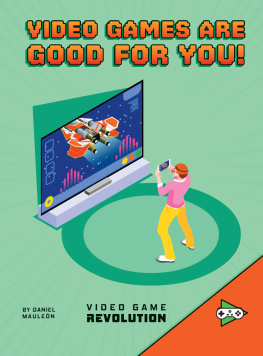
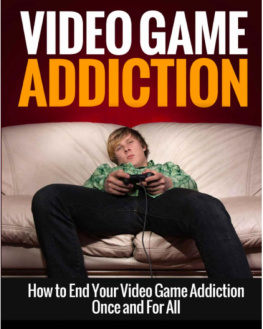


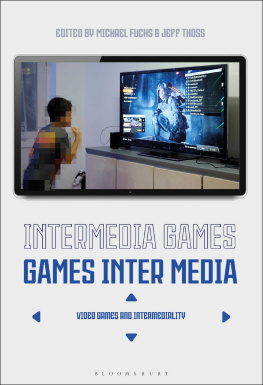
![Mark J. P. Wolf (editor) - Encyclopedia of Video Games: The Culture, Technology, and Art of Gaming [3 volumes]](/uploads/posts/book/279290/thumbs/mark-j-p-wolf-editor-encyclopedia-of-video.jpg)
